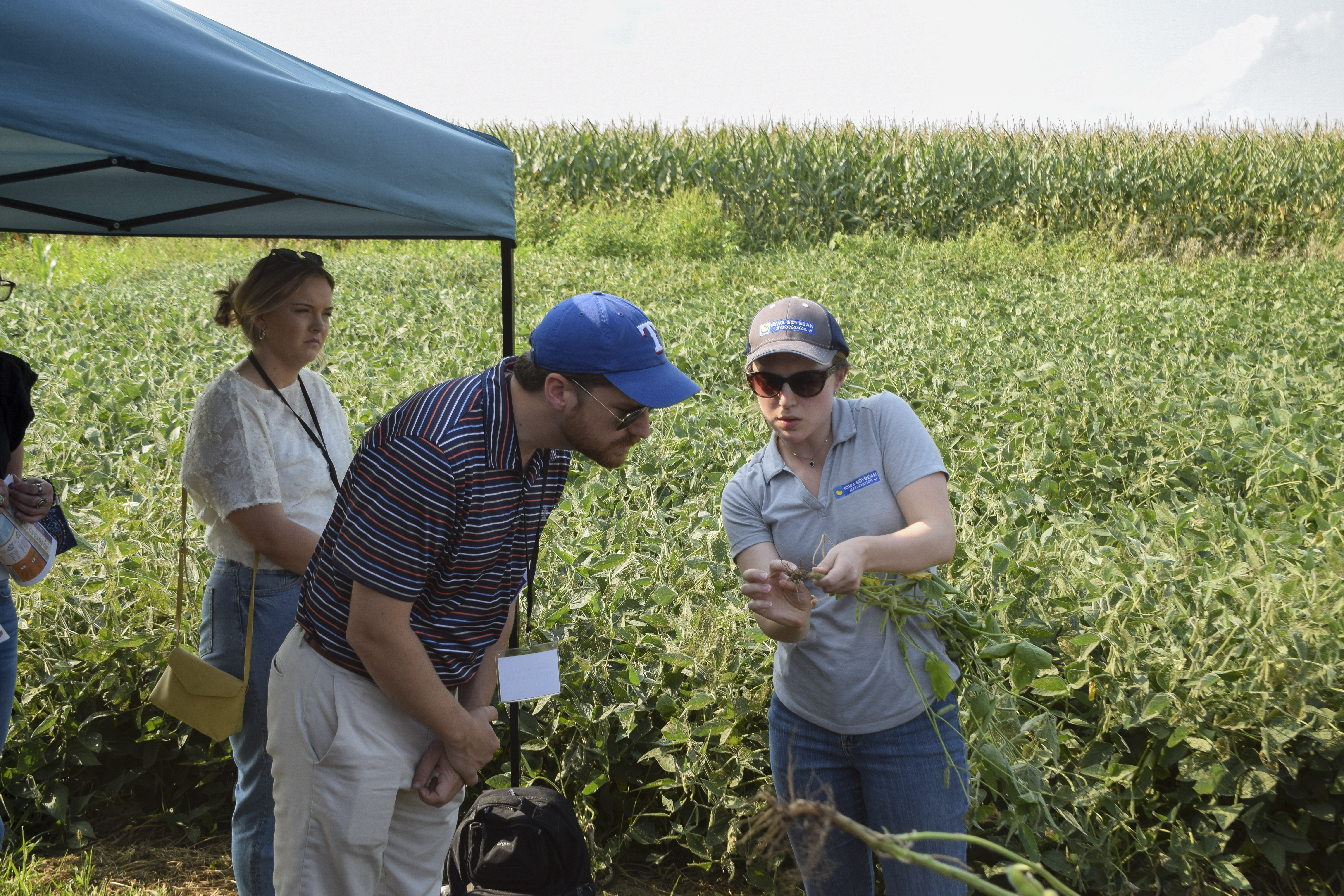
Teresa Middleton, ISA field services program manager, provides an up-close look at a soybean plant during the biofuels tour. (Photo: Bethany Baratta/Iowa Soybean Association)
Tour provides D.C. staffers up-close look at biofuels, Iowa ag
September 9, 2021 | Bethany Baratta
A sixth-generation farm provided a backdrop for a recent tour providing an up-close look at soybeans, biofuels and modern agriculture.
The Kimberley family hosted a stop of the 12th annual Biofuels: Science and Sustainability Tour, which brings Washington, D.C., staffers to Iowa to learn more about agriculture and biofuels. There, the staffers, many of whom work for Congressional representatives, learned about the multi-generational farm, the machinery and technology on the farm, and saw soybeans and corn up close.
As the national debate continues about the future of American transportation, the tour provided the 30 staffers the opportunity to see how their actions on Capitol Hill impact farmers, producers and consumers.
"These Congressional staffers and visitors are strongly involved in the work of the Senate or House members, so we want to make sure they are familiar with the issues and have an understanding of our perspective,” said Grant Kimberley, who hosted the tour with his dad, Rick. Grant is the director of market development for the Iowa Soybean Association. “It’s about relationship- and knowledge-building to help build concepts and context for them.”
The Iowa Renewable Fuels Association hosted the tour; the Iowa Soybean Association, the Iowa Biodiesel Board and the National Biodiesel Foundation were among several sponsors of this year’s tour.
“As farmers we need to get the message out about what we do, why we do it and how we do it,” said ISA President Jeff Jorgenson, who farms near Sidney. “At the end of the day farmers produce way more than what we need in the United States, so we have to have exports and other opportunities to move the crop that we produce,” he reinforced to tour attendees.
One way of moving the pile of soybeans is through biodiesel production. Iowa ranks second in soybean production, harvesting 494 million bushels of soybeans in 2020. However, Iowa is the leading producer of biodiesel in the nation with production capacity of nearly 400 million gallons annually. That’s good for soybean farmers.
Biodiesel production adds 13% of the net market value to soybeans, or around $1.70 when soybean prices are $13 per bushel.
Biodiesel reduces feed costs for livestock producers by $25 to $40 per ton resulting from the additional production of soybean meal.
While much of the talk in Washington, D.C., centers around electric vehicles, biodiesel is an immediate solution toward emissions reduction, says Jeff Earl, director of state regulatory affairs for the National Biodiesel Board.
“In D.C. they (staffers) are constantly hearing about electrification. So it’s continuing to remind them that there’s something right here in the heartland (biodiesel) they can use that’s going to help reach their carbon emission reduction goals,” Earl said.
Hearing the history of the Kimberley farm, seeing the lineup of machinery used there, and learning about soybean and corn production, drone imaging and other technology used on the farm was an eye-opening experience for Joshua Lobert, counsel for the House Committee on Agriculture. It was the first time Lobert participated in the tour.
“What resonated with me the most was how complicated the industry is and how much education you have to have to become a proficient farmer. It’s amazing how much science there is,” Lobert said. “I’m a lawyer and there’s no way I could be a farmer. No way.”
Lobert learned about the legacy of the Kimberley farm, hearing stories from the family about China President Xi Jingping’s visit to their farm in 2012 as the Kimberley family talked about the importance of relationships and markets. He saw crops up close, including a lesson on the soybean life cycle, its history and its uses from Iowa Soybean Association Field Services Coordinator Teresa Middleton.
As Lobert wrapped up the tour he reflected on his biofuels tour in Iowa.
“What I really am taking back is a fuller appreciation of how important local context is,” he said. “Every single farm is different. Every single region is different. To do policy you really have to understand regional context.”
Learn more about the other stops along the tour here.
Back